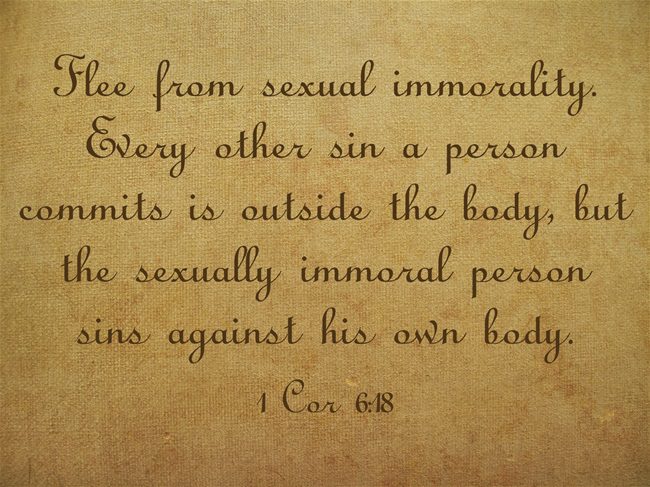Does God call one sin worse than another? Are some sins more serious than others?
Is All Sin the Same?
Have you ever heard any Christian says, “Sin is sin” when they hear of a fellow Christian falling into sin? Is that true? I think its clear even in society not all crimes are the same and we don’t say, “Crime is crime.” A man stealing food to feed his family is not the same crime as one murdering him. Murder is worse than stealing. Stealing is worse than lying (except under oath). Running a red light is worse than a parking ticket, and so in similar fashion, the Old Testament civil laws and subsequent penalties differed in severity. Some were minor offenses and they party could make restitution but some were more serious and required a more severe penalty. It just depends on the nature of the crime or the law broken. Leviticus 24:17 says “Whoever takes a human life shall surely be put to death.” Murder was among those sins that required the death penalty. Otherwise, I believe the right to take a life belongs to God alone because He is the Author of Life (Acts 3:15), and every human is created in the image of God (Gen 1:27). Only He can give life and only He can take it. That’s what makes abortion such an abomination. Today, the most hardened criminals convicted of the most heinous crimes and some of which are so cold-blooded and premeditated as to necessitate their confinement for life; maybe even receive the death penalty. A few states would give the death penalty for such a criminal but few would ever carry it out. Taking the life of a mass murderer is one way to make sure he doesn’t murder again (even in prison). All crimes are not the same, just as all sins are not the same. Some are considerably more serious and have graver consequences.
Sinning against the Body
The Apostle Paul seemed to indicate that there was a sin that was worse than others…far worse in fact. Paul knew that the city of Corinth was full of pagan practices that included sexual orgies and wine parties and some of the Christians in Corinth had problems with sexual immorality. They must have because Paul would never have addressed such an issue that wasn’t an issue with the local church, so he writes, “The body is not meant for sexual immorality, but for the Lord, and the Lord for the body” (1st Cor 6:13) and so he asked them, don’t you “know that your bodies are members of Christ? Shall I then take the members of Christ and make them members of a prostitute? Never” (1st Cor 6:15)! When a man and a woman come together in marriage, they become as one flesh (Gen 2:24). Whoever you are joined too in a sexual relationship, you are members of that same person. If they’ve slept with a hundred others before that, then they’re members joined to the one as well.
The Risks of Sin
The risk of sexually transmitted disease is sin enough against the body, physically speaking, but the greater and more significant sin is being joined with the person who is not their spouse and committing this sin with impenitence or with no repentance, will pay the ultimate price of that sin (Rev 21:8). All un-repented of sin of every one who’s now rejected or ever has rejected Christ, will have to bear their own sin someday, in eternity (Rev 20:12-15). This is why Paul warns them (and us), “Flee from sexual immorality. Every other sin a person commits is outside the body, but the sexually immoral person sins against his own body” (1st Cor 6:18).
It Only Takes Only One
After writing about the different levels of the penalty of sins, it’s important to note that it only takes one sin to be placed under the wrath of God. That we would only have one sin is, of course, impossible, for that is our nature. We are all just as all men and women; “abominable and corrupt, a man who drinks injustice like water” (Job 15:16)! The Bible teaches that “None is righteous, no, not one” (Rom 3:10). Your best human righteousness couldn’t buy you (or me) one second in heaven because God is holy and He demands we be holy (Lev 11:44; 1st Pet 1:16), and that’s a problem and more than a big problem; it’s an impossibility because we’ve been cut off from God by our sins (Isaiah 59:2). For all our sins there is one possible solution. That is when God brings a person to repentance, they forsake their former sins and turn to God and place their trust in Christ. That doesn’t mean they’re sinless…although, over time, they will sin less. Never actually being holy, but always growing toward holiness.
Conclusion
The good news is good because of the work of Christ on the cross on our behalf. The Apostle Paul defines how we are forever cleansed from all unrighteousness. It was “For our sake he made him to be sin who knew no sin, so that in him we might become the righteousness of God” (2nd Cor 5:21). We have no righteousness (Rom 3:10) and “nothing unclean will ever enter it, nor anyone who does what is detestable or false, but only those who are written in the Lamb’s book of life” (Rev 21:27). My question for you is, will you enter the kingdom or go to another place (Rev 20:12-15)?
Article by Jack Wellman
Jack Wellman is Pastor of the Mulvane Brethren Church in Mulvane Kansas. Jack is also the Senior Writer at What Christians Want To Know whose mission is to equip, encourage, and energize Christians and to address questions about the believer’s daily walk with God and the Bible. You can follow Jack on Google Plus or check out his book Teaching Children the Gospel available on Amazon.












